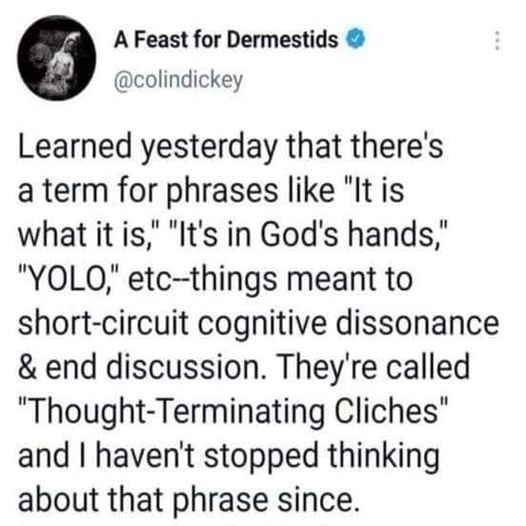this post was submitted on 16 May 2024
1145 points (98.1% liked)
People Twitter
7390 readers
758 users here now
People tweeting stuff. We allow tweets from anyone.
RULES:
- Mark NSFW content.
- No doxxing people.
- Must be a pic of the tweet or similar. No direct links to the tweet.
- No bullying or international politcs
- Be excellent to each other.
- Provide an archived link to the tweet (or similar) being shown if it's a major figure or a politician.
founded 2 years ago
MODERATORS
you are viewing a single comment's thread
view the rest of the comments
view the rest of the comments

Or just "thought-stoppers".
Loaded language meant to quell criticism and dissent.
Jesus Christ, Lemmy is way too anarchist for me to handle sometimes.
People just don't want to think about stuff that doesn't affect them or that they can't change. Not everything is some kind of fascist conspiracy.
It is what it is, ya know?
Que sera, sera.
Es lo que hay
C'est la vie...
Kaya nya.
Hakuna Matata
没办法
They are just pointing out that these phrases are used for that, which is why they are recognized as "thought-terminating cliches", it doesn't mean they are always used in such a way. You can be aware of manipulative language without being an anarchist or commie.
The loaded language having an "intention" doesn't mean that intent is necessarily consciously realised by the speaker.
When I waa growing up, the f-slur for gay men was used pretty liberally without it having any related meaning to us. We didn't hate or even dislike gays. It was just "something people said" and we picked up on it and used it.
Now I have to say that a lot of those people really did turn out to be homophobes, but as it was a rural village, the chances were high anyway.
The point I'm making is that speakers can spread the "intention" or connotation of a phrase without even ever having understood it's meaning.
Yeah, I understand this, and that's part of the problem. People think they can't affect change, so they don't want to think about change, so they say things like "we can't change things, it is what it is" and then someone who still had hope (but looks up to the speaker) loses their hope of change, and also starts using said language.
Accepting defeat is certain defeat.
Ofc in a lot of conversations, it might not be political at all. Sometimes you can't change things, as you have no agency. Like we used a lot of these semantic stop signs just as coping tools in the army. Digging a well into frozen ground, manually, in -20C... "it is what it is."
But it is exactly loaded language. It's just that not every use is malicious or political. They can be mundane and arbitrary criticisms that are quelled as well.
Edit also I do not identify with anarchism
I feel the opposite, this website has too many right wing chuds annoyingly complaining that eveyone is a tankie or some shit.. its fucking annoying give it a rest already jeez
i mean, they aren't wrong, it's not like it's an invalid interpretation of it.
the more polite way of telling someone off than insults and slurs.